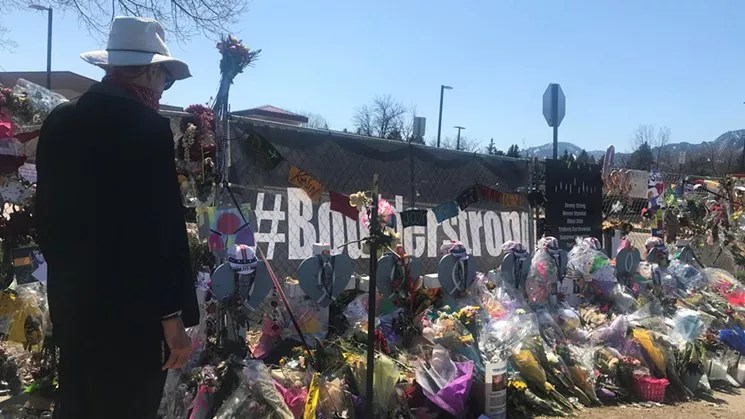
Michael Roberts

Audio By Carbonatix
It’s been two years since a gunman killed ten people at the King Soopers on Table Mesa Drive in Boulder on March 22, 2021, and the state still hasn’t put him on trial.
Two years of grieving…of no justice.
This has become a never-ending norm for mass shooters in Colorado over the past decade, with victims having to heal slowly and turn to other means for legal accountability. In the case of the mass tragedy in Boulder, the accused killer, Ahmad Al Aliwi Alissa, hasn’t yet been found competent to stand trial.
“Boulder is kind of different, because [the defendant’s] experts are coming back and saying not only did he not understand his actions, but he is still at a point where he can’t even understand what’s going on in the proceedings, so they haven’t even set a trial date, which makes it difficult for the victims,” says Phil Harding, a Denver-based civil attorney who is coordinating a recently filed lawsuit against Sturm, Ruger & Co., the manufacturer of the gun used in the 2021 massacre.
“The victims, number one, have no closure,” Harding adds. “And number two, if they bring any civil suits, they’d like to get information that the DA has worked on to help them with the civil suit to find possible defendants.”
As those who were impacted by the King Soopers tragedy work to heal, they’ve often had to navigate difficult financial situations while grappling with the struggle for legal accountability. If the Boulder case does go to trial, there will be even more challenges ahead, as court appearances can be traumatizing for survivors and family members of those who were killed.
Harding notes that the Ruger lawsuit he’s helping coordinate in Connecticut – where the gun manufacturer is based – can be pushed through without any additional information from the DA’s office. But details revealed in the course of a criminal trial can often help tremendously in civil suits.
These are just a few of the many reasons that the pace of criminal prosecution has been so frustrating for those affected by tragic events over the years, especially in Colorado.
While many mass murderers often die at the end of their attacks, either by their own hand (the Columbine killers) or that of the authorities (the tattoo shooter in December 2021), there have been several recent instances where the suspects have lived and the victims’ families are forced to endure years of legal setbacks.
Here’s the status of court proceedings connected to five of Colorado’s mass tragedies:
Club Q
The 22-year-old Club Q shooting suspect, who opened fire at the LGBTQ+ nightclub in Colorado Springs late on November 19, killing five people, faces more than 300 counts of first-degree murder, attempted murder and bias-motivated crimes or hate crimes. But the accused shooter hasn’t even been arraigned yet.
Anderson Lee Aldrich, who is being held without bond, will stay in the El Paso County Jail for months before he learns if he will ever stand trial for the shooting rampage. His arraignment isn’t scheduled until May 30, at which point the defense will have the opportunity to enter a mental health defense after an evaluation by a psychologist.
District Attorney Michael Allen, who is in charge of the Fourth Judicial District, where the case is being prosecuted, says he hopes a trial will happen this year, but it’s likely that the timeline could extend to 2024.
At the accused shooter’s February 22 preliminary hearing, defense attorney Joseph Archambault presented evidence of mental health problems his client may have, including photos of prescriptions in his name used to treat schizophrenia, bipolar disorder and anxiety. Archambault also argued that there wasn’t enough proof that bias motivated the shooting rampage.
The Anti-Defamation League included the Club Q shooting in its “Murder and Extremism in the United States in 2022” report, owing to growing signs that Aldrich was connected with the accelerationist white supremacy movement. “Accelerationism,” which has grown popular in recent years, is based on the idea that it isn’t possible to sway the government to buy into white supremacy, and the best course of action is to destroy the existing society so that a new one can be built.
“Accelerationist white supremacists want to do anything to hasten and accelerate the demise of current society,” says Mark Pitcavage, senior research fellow for the ADL’s Center for Extremism. “That includes acts of mass violence, especially against perceived enemies.” Pitcavage notes that white supremacists consider the LGBTQ+ community an enemy, and its members have become a frequent target.
At the end of Aldrich’s preliminary hearing, Judge Michael McHenry ruled that the prosecution had provided enough evidence for all the charges to proceed. Another hearing is scheduled to take place on March 31, to determine if security footage from the night of the shooting should be released to the public.

The sign welcoming shoppers to the Table Mesa King Soopers.
Photo by Michael Roberts
King Soopers
In February, the Boulder County District Attorney’s Office filed a motion seeking a neuropsychological exam of accused King Soopers shooter Ahmad Al Aliwi Alissa, who faces multiple charges of first-degree murder, attempted first-degree murder, assault, possessing banned large-capacity magazines and more than 45 crime-of-violence sentence enhancers. The enhancers would increase the sentencing range for the crimes, making minimums and maximums higher.
The accused shooter, however, was deemed incompetent to stand trial in December 2021.
Michael Dougherty, Boulder’s district attorney, wanted another examination done – this time by a prosecution-selected forensic neuropsychologist – to be sure the accused is truly incompetent. On March 14, however, a judge ruled that such an evaluation would be considered treatment and therefore can’t be ordered by anyone outside of Alissa’s medical team.
Unless and until he is deemed competent, Alissa will continue to be treated for his symptoms at a psychiatric institute. He is currently at the Colorado Mental Health Hospital in Pueblo.
STEM School
The STEM School Highlands Ranch killer, Devon Erickson, offers another example of Colorado’s tendency to drag its legal feet when it comes to mass shooters.
While eighteen-year-old Kendrick Castillo was the only person who died during Erickson and Alec McKinney’s May 2019 attack – which left eight others injured – the entire community was deeply impacted by what happened. It wound up taking nearly a year to arraign Erickson on murder and attempted-murder charges, and then another two years to convict and sentence him. Parkland shooter Nikolas Cruz, meanwhile, was arraigned just one month after his massacre in Florida, according to CNN.
“This crime occurred 240 days ago,” said 18th Judicial District Attorney George Brauchler during Erickson’s January 2020 arraignment, in which his defense tried delaying things even further with mental exams and incompetency claims. “It’s time to move forward with getting this case set.”
It wasn’t until June 2021 that Erickson’s trial came to a close and he was convicted of first-degree murder, attempted first-degree murder, conspiracy to commit first-degree murder and supplying a juvenile with a handgun. He was sentenced to life in prison without parole in September 2021.
McKinney, who was sixteen at the time of the STEM School shooting spree, pleaded guilty to first-degree murder in February 2020 and was hit with a life sentence plus 38 years. While Erickson is expected to spend the rest of his days behind bars, McKinney – who claimed to be a victim of bullying – will be eligible for parole after forty years, since he was still a minor when the shooting occurred.

Robert Dear attacked a Colorado Springs Planned Parenthood office in November 2015.
Colorado Springs Police Department
Planned Parenthood
One of the most infamous examples of Colorado courts moving at a snail’s pace is the case of Robert Dear, who’s accused of killing three people and wounding eight others at the Colorado Springs Planned Parenthood on Thanksgiving weekend in 2015 – and still hasn’t been put on trial.
Dear reportedly targeted the clinic because of his anti-abortion sentiments. “He was a single-issue extremist,” says the ADL’s Pitcavage. “Since the mid-1990s, anti-abortion extremists will occasionally attempt to murder physicians who provide abortions, or staff at clinics, or security guards, or volunteers helping at such clinics.”
A delusional disorder diagnosis is reportedly preventing state prosecutors from moving forward with Dear’s case. Last year, at a U.S. District Court hearing in Denver, Judge Robert Blackburn determined that Dear could be forcibly medicated for his delusional disorder in an attempt to make him competent for trial. But the defense appealed that decision, putting off action yet again.
Dear also faces federal weapons charges as well as charges for using violence to prevent others from receiving reproductive health care services. He is still receiving psychiatric treatment, and unless he is eventually determined to be competent, that could be the situation for the rest of his life.
“Sometimes that’s the case, where someone has never been able to be returned to competency and thus stand trial for their crimes,” Pitcavage says. “Even after an extended period of time, they can finally be restored to competency, but it’s never a sure thing.”
Aurora Theater
In July 2012, a gunman murdered twelve people and wounded more than sixty others inside a movie theater in Aurora. It wasn’t until three years later – in August 2015 – that James Holmes was formally sentenced by state prosecutors after a jury determined that he would not be put to death. Instead, Holmes received a life sentence for each person killed and additional time for the attempted murders of those who survived, as well as an explosives charge. It wound up being one of the longest sentences in Colorado history.
The public defenders representing Holmes had attempted an insanity defense; however, jurors dismissed that idea. He is still in prison today, locked away at the United States Penitentiary, Allenwood, in Pennsylvania, according to the Washington Post.
Just over ten years after the shooting, state Senator Tom Sullivan – whose son Alex was killed in the mass tragedy – is putting forth legislation to strengthen Colorado’s extreme risk protection order law, which currently allows law enforcement officials or family members to petition for an order that temporarily makes people who pose a danger to themselves or others unable to purchase or possess firearms.
The proposed bill would also allow licensed medical care providers, licensed mental health care providers, licensed educators and district attorneys to petition for such orders. Sullivan’s continued fight is just one example of how the repercussions of these events don’t end just because the perpetrator is sentenced.
“The wheels of justice, they slowly turn,” Harding concludes.